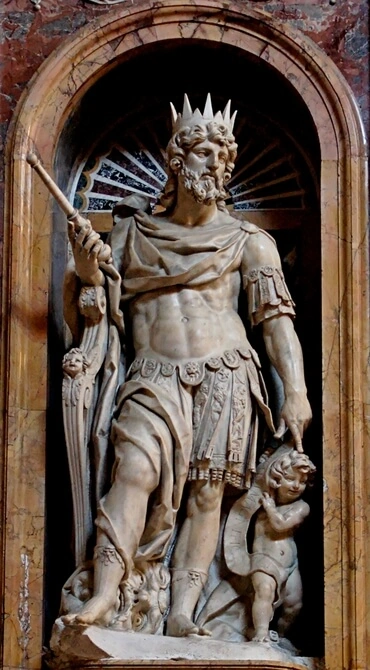1
היתה עלי יד יהוה ויוצאני ברוח יהוה ויניחני בתוך הבקעה והיא מלאה עצמות׃
2
והעבירני עליהם סביב סביב והנה רבות מאד על פני הבקעה והנה יבשות מאד׃
3
ויאמר אלי בן אדם התחיינה העצמות האלה ואמר אדני יהוה אתה ידעת׃
4
ויאמר אלי הנבא על העצמות האלה ואמרת אליהם העצמות היבשות שמעו דבר יהוה׃
5
כה אמר אדני יהוה לעצמות האלה הנה אני מביא בכם רוח וחייתם׃
6
ונתתי עליכם גדים והעלתי עליכם בשר וקרמתי עליכם עור ונתתי בכם רוח וחייתם וידעתם כי אני יהוה׃
7
ונבאתי כאשר צויתי ויהי קול כהנבאי והנה רעש ותקרבו עצמות עצם אל עצמו׃
8
וראיתי והנה עליהם גדים ובשר עלה ויקרם עליהם עור מלמעלה ורוח אין בהם׃
9
ויאמר אלי הנבא אל הרוח הנבא בן אדם ואמרת אל הרוח כה אמר אדני יהוה מארבע רוחות באי הרוח ופחי בהרוגים האלה ויחיו׃
10
והנבאתי כאשר צוני ותבוא בהם הרוח ויחיו ויעמדו על רגליהם חיל גדול מאד מאד׃
11
ויאמר אלי בן אדם העצמות האלה כל בית ישראל המה הנה אמרים יבשו עצמותינו ואבדה תקותנו נגזרנו לנו׃
12
לכן הנבא ואמרת אליהם כה אמר אדני יהוה הנה אני פתח את קברותיכם והעליתי אתכם מקברותיכם עמי והבאתי אתכם אל אדמת ישראל׃
13
וידעתם כי אני יהוה בפתחי את קברותיכם ובהעלותי אתכם מקברותיכם עמי׃
14
ונתתי רוחי בכם וחייתם והנחתי אתכם על אדמתכם וידעתם כי אני יהוה דברתי ועשיתי נאם יהוה׃
16
ואתה בן אדם קח לך עץ אחד וכתב עליו ליהודה ולבני ישראל חברו ולקח עץ אחד וכתוב עליו ליוסף עץ אפרים וכל בית ישראל חברו׃
17
וקרב אתם אחד אל אחד לך לעץ אחד והיו לאחדים בידך׃
18
וכאשר יאמרו אליך בני עמך לאמר הלוא תגיד לנו מה אלה לך׃
19
דבר אלהם כה אמר אדני יהוה הנה אני לקח את עץ יוסף אשר ביד אפרים ושבטי ישראל חברו ונתתי אותם עליו את עץ יהודה ועשיתם לעץ אחד והיו אחד בידי׃
20
והיו העצים אשר תכתב עליהם בידך לעיניהם׃
21
ודבר אליהם כה אמר אדני יהוה הנה אני לקח את בני ישראל מבין הגוים אשר הלכו שם וקבצתי אתם מסביב והבאתי אותם אל אדמתם׃
22
ועשיתי אתם לגוי אחד בארץ בהרי ישראל ומלך אחד יהיה לכלם למלך ולא יהיה עוד לשני גוים ולא יחצו עוד לשתי ממלכות עוד׃
23
ולא יטמאו עוד בגלוליהם ובשקוציהם ובכל פשעיהם והושעתי אתם מכל מושבתיהם אשר חטאו בהם וטהרתי אותם והיו לי לעם ואני אהיה להם לאלהים׃
24
ועבדי דוד מלך עליהם ורועה אחד יהיה לכלם ובמשפטי ילכו וחקתי ישמרו ועשו אותם׃
25
וישבו על הארץ אשר נתתי לעבדי ליעקב אשר ישבו בה אבותיכם וישבו עליה המה ובניהם ובני בניהם עד עולם ודוד עבדי נשיא להם לעולם׃
26
וכרתי להם ברית שלום ברית עולם יהיה אותם ונתתים והרביתי אותם ונתתי את מקדשי בתוכם לעולם׃
27
והיה משכני עליהם והייתי להם לאלהים והמה יהיו לי לעם׃
28
וידעו הגוים כי אני יהוה מקדש את ישראל בהיות מקדשי בתוכם לעולם׃







